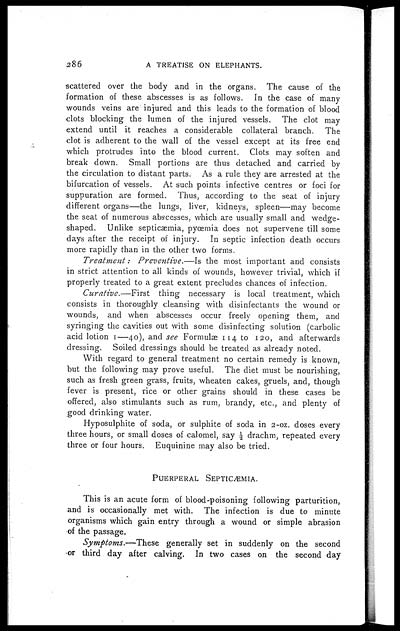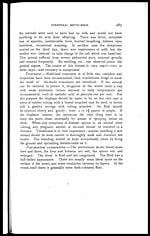Medicine - Veterinary > Veterinary diseases > Elephants and their diseases > Part V - Infective diseases
(348) Page 286
Download files
Individual page:
Thumbnail gallery: Grid view | List view

286 A TREATISE ON ELEPHANTS.
scattered over the body and in the organs. The cause of the
formation of these abscesses is as follows. In the case of many
wounds veins are injured and this leads to the formation of blood
clots blocking the lumen of the injured vessels. The clot may
extend until it reaches a considerable collateral branch. The
clot is adherent to the wall of the vessel except at its free end
which protrudes into the blood current. Clots may soften and
break down. Small portions are thus detached and carried by
the circulation to distant parts. As a rule they are arrested at the
bifurcation of vessels. At such points infective centres or foci for
suppuration are formed. Thus, according to the seat of injury
different organs—the lungs, liver, kidneys, spleen—may become
the seat of numerous abscesses, which are usually small and wedge-
shaped. Unlike septicaemia, pyœmia does not supervene till some
days after the receipt of injury. In septic infection death occurs
more rapidly than in the other two forms.
Treatment : Preventive.—Is the most important and consists
in strict attention to all kinds of wounds, however trivial, which if
properly treated to a great extent precludes chances of infection.
Curative.—First thing necessary is local treatment, which
consists in thoroughly cleansing with disinfectants the wound or
wounds, and when abscesses occur freely opening them, and
syringing the cavities out with some disinfecting solution (carbolic
acid lotion 1—40), and see Formulae 114 to 120, and afterwards
dressing. Soiled dressings should be treated as already noted.
With regard to general treatment no certain remedy is known,
but the following may prove useful. The diet must be nourishing,
such as fresh green grass, fruits, wheaten cakes, gruels, and, though
fever is present, rice or other grains should in these cases be
offered, also stimulants such as rum, brandy, etc., and plenty of
good drinking water.
Hyposulphite of soda, or sulphite of soda in 2-oz. doses every
three hours, or small doses of calomel, say ½ drachm, repeated every
three or four hours. Euquinine may also be tried.
PUERPERAL SEPTICÆMIA.
This is an acute form of blood-poisoning following parturition,
and is occasionally met with. The infection is due to minute
organisms which gain entry through a wound or simple abrasion
of the passage.
Symptoms.—These generally set in suddenly on the second
or third day after calving. In two cases on the second day
Set display mode to: Large image | Zoom image | Transcription
Images and transcriptions on this page, including medium image downloads, may be used under the Creative Commons Attribution 4.0 International Licence unless otherwise stated. ![]()
| India Papers > Medicine - Veterinary > Veterinary diseases > Elephants and their diseases > Infective diseases > (348) Page 286 |
|---|
| Permanent URL | https://digital.nls.uk/75193104 |
|---|



![[Page 285]](https://deriv.nls.uk/dcn4/7519/75193103.4.jpg)
